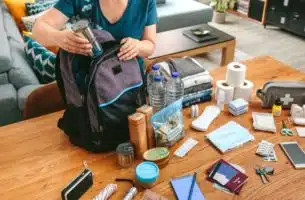
This year, the National Oceanic and Atmospheric Administration (NOAA) predicts an above average Atlantic hurricane season, with more named storms and hurricanes than usual. But what does that mean for you?
Your risk of hurricane damage depends on where you live, the severity of the hurricane, and how prepared you are when a hurricane strikes. Although some storm damage is often unavoidable, the good news is that careful preparation can minimize the threat to you and your loved ones. It is important to stay aware of your risk and to act quickly before and after hurricanes strike.
To reduce the stress of hurricane damage, consider hiring an experienced hurricane damage attorney to take care of your claim while you work on getting back to normal. At Insurance Claim HQ, we take the safety of our community seriously, which is why our experts shared these tips on how to stay ahead of the storm. In this article, we will provide emergency preparedness tips to help you reduce your damage and keep your loved ones safe in the event of a hurricane.
1. Know Your Hurricane Risk
Whether it’s a tropical storm or a severe hurricane, location is everything.
If you live near water—especially the ocean—you are at the highest risk of damage from a hurricane. Hurricanes build power over the ocean and slowly lose severity as they make landfall. This makes residents who live close to the gulf coast, like those in Southeast Louisiana, extremely vulnerable compared to those who live further inland.
Tropical storms use water and wind to produce the most damage possible, so if you live in an exposed area close to the water, be sure to stay aware of any incoming storms.
When is Atlantic Hurricane Season?
According to NOAA, the Atlantic hurricane season is from June 1 to November 30. During this time, there is a much higher risk of hurricanes and tropical storms for those in proximity to the Atlantic Ocean and Gulf of Mexico due to higher temperatures and ongoing weather conditions.
NOAA predicts that the 2022 Atlantic hurricane season will be the 7th consecutive above-average hurricane season due to ongoing La Niña conditions, among other factors. If you live in the Atlantic region, please stay aware of these conditions and exercise caution during hurricane season.
An Important Word About Flood Insurance
If you live in an area that floods easily, make sure you have flood insurance. This coverage is not usually provided by default as part of a standard homeowners insurance policy, but must be purchased as a separate policy.
In the United States, the federal government provides flood insurance to property owners in participating communities through the National Flood Insurance Program, often through partnerships with insurance companies. If you aren’t sure whether or not you have flood insurance, contact your current homeowners insurance provider to see whether they offer this coverage in your area.
Many homeowners assume they are protected, then have to deal with the heartbreak of denied claims after a storm. Don’t let this happen to you!
2. Make an Emergency Plan
When a hurricane threatens the safety of you and your loved ones, you need to know what to do. Having an emergency plan in case of any potential severe hurricanes helps give you peace of mind and keep you safe.
To begin, you should consider an evacuation route in case the worst happens. Hurricane Ida, Hurricane Laura, and Hurricane Katrina all spanned multiple states, so having options that fit different scenarios and levels of storm severity can help you be prepared for any conditions.
Once you have established an evacuation route, be sure to review it carefully with your loved ones. When disaster strikes, you can’t afford to be unsure about where to go and what to do.
Once you know where to go in case of emergency, you need to know what you’re bringing with you. As tempting as it may be to bring your favorite personal items, it is important to stick to the basics and essentials.
Some items to consider packing in an emergency kit include:
- One gallon of water per person per day for at least three days, for drinking and sanitation
- At least a three-day supply of non-perishable food
- A battery-powered or hand-crank radio
- Flashlight and extra batteries
- First aid kit, including any necessary prescription medication
- Whistle to signal for help
- Dust mask, in case of contaminated air
- Plastic sheeting and duct tape to shelter in place
- Moist towelettes, garbage bags, and plastic ties for personal sanitation
- Wrench or pliers to turn off utilities
- Cash or travelers’ checks
- Pet food or infant formula, depending on your situation
Having the right emergency supplies can be the difference between life and death in a worst-case scenario. But even if you are not in life-threatening danger, the right supplies will still ease your stress and help you in case of dangerous conditions.
RELATED: How Long Do I Have to File an Insurance Claim After a Hurricane?
3. Have Ways to Receive Warnings and Alerts
In the age of modern technology, our phones are one of our most used items. But what many don’t consider is that phones can save lives in times of emergency. During a hurricane, access to a phone—especially a smartphone—can make sure you get the information you need most, right when you need it.
However, simply having a smartphone isn’t enough. A dead phone is no use to you in case of emergency, so make sure you have access to a charge. Keep your charger with you, as well as an external battery pack to supply power if you’ll be without access to a working outlet for a while. If you need to conserve battery life, reduce screen brightness, disable unnecessary apps and notifications, and minimize unnecessary screen time. Now isn’t the time to watch YouTube or play games!
Of course, even a working phone at full battery isn’t going to be much help if cell towers are experiencing outages and you can’t get a signal. Fortunately, smartphones aren’t the only way to get information during hurricane season. Radios provide on-time information that can keep you and your loved ones safe during a storm surge. Be sure to pack a battery-powered or hand-crank radio in your emergency kit so you can get updates, even without access to a power source.
Monitor the National Hurricane Center Website and Other Apps
The internet is the greatest source of information in the world and has everything you need to prepare for an oncoming tropical storm. The National Oceanic and Atmospheric Administration sends out live updates on incoming hurricanes through the National Hurricane Center website. It is your single most valuable resource for hurricane preparedness.
If you are looking to monitor the weather through an easier-to-use format, consider downloading more advanced weather apps that can give you an accurate assessment of future weather conditions. Even using the basic weather app on your smartphone is better than nothing, so be sure to use whatever information resources are available to you.
RELATED: How Do I File a Hurricane Ida Insurance Claim?
Insurance Claim HQ: Looking out for Hurricane Victims Across Louisiana
At Insurance Claim HQ, we have seen the devastation that hurricanes can have on the residents of New Orleans, LA, as well those in other communities statewide. That’s why we are committed to taking care of our neighbors and ensuring that they get the help they need. We hold the insurance company accountable for the damage your home may have received during hurricane season and fight back if they unfairly deny or reduce your insurance claim.
If you or a loved one believe you have a hurricane damage claim, but are unsure what to do next, call Insurance Claim HQ at 844-587-8395 or contact us today to schedule your free consultation.
References
NOAA. (24 May 2022) NOAA predicts above-normal 2022 Atlantic Hurricane Season. National Oceanic and Atmospheric Administration. https://www.noaa.gov/news-release/noaa-predicts-above-normal-2022-atlantic-hurricane-season
University of Nebraska-Lincoln. Emergency Response: Preparation. University of Nebraska-Lincoln. https://safety.unl.edu/emergency-response/preparation/
The content provided here is for informational purposes only and should not be construed as legal advice on any subject.
